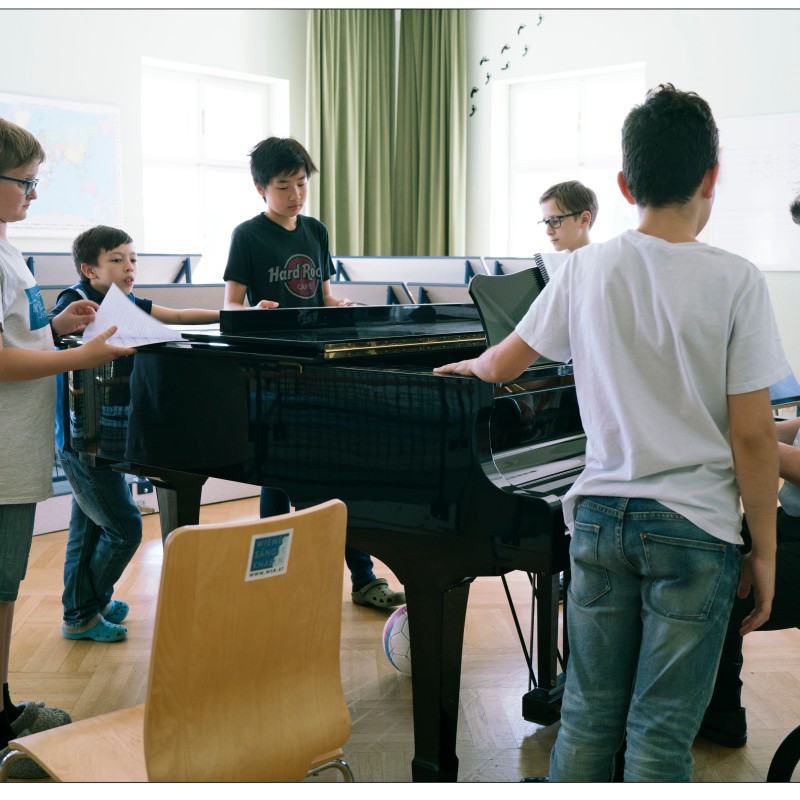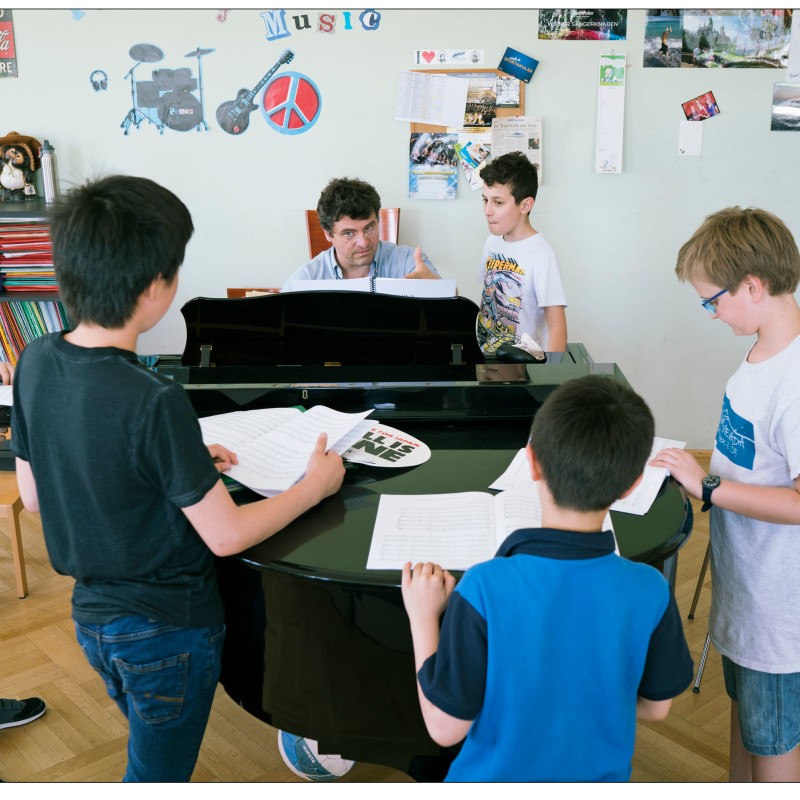Monday
20
June
to
Monday
20
June
Carmina austriaca
On 25 June, we will
participate in a world premiere in Grafenegg, Lower Austria. Gerald Wirth, president of the Vienna Boys Choir, has written
a symphonic cantata for mixed chorus, boys choir, and a large orchestra. It is based on medieval songs by famous minstrels:
the Carmina austriaca. Our choirmaster, Luiz de Godoy, has taught us our parts.
The rehearsal starts at 11; we go through our warm-up routine, first a few physical exercise to loosen muscles, then a vocal jog. We start to practise the boys’ choir passages of Carmina burana; we sing six pieces. Two pieces are for boys’ choir alone, the other four are sung by everyone, we sing alongside the adult singers, the orchestra, and the adult soloists. Exciting stuff. Earlier this year, we performed an opera by Mr Wirth, the Beggar Boy, so we know his composing style. The rhythm is fiendish, really tricky. It helps if you count, but how can you count in a passage of free rhythm? We are starting to sweat a little.
At 11.30, the door opens. It is Mr Wirth. We get up while singing, by way of greeting. Mr Wirth waves at us to sit. And we do.
Mr Wirth starts with the opening fanfare. We sing a kind of introduction, like a herald announcing some event on a market square. Felix thinks, more like a TV announcer. People have to know what to expect, and you have to inject the right amount of drama into your voice. “You are about to witness heroic deeds and hijinks”, or words to that effect in Middle High German. I personally prefer the sentence about brave knights and their fighting.
Mr Wirth sings the phrase to us, to show us what impression he wants to create. “Tell your audience a story, keep the suspense”, he says. “You have to enthral them – like a well-executed chant.” En-chanting; a-ha. So we give it a try, with Mr Wirth egging us on, “Go on - don’t stop”. So we don’t; we keep singing. Mr Wirth finds us breathy; we need to sing on one breath, or breathe as a choir, surreptitiously. We are good at surreptitious; life-long practice. But we are having a hard time getting the free rhythm right. You cannot have everyone sing their own rhythm; that is chaos. Mr Wirth nods, “That is difficult for a choir. You have to listen to each other. No two quavers should be alike.” We try again, and this time, it seems to work, brave knights a-fighting. “Good”, says Wirth, “lovely sound. But I cannot hear your consonants.” So the brrrrave knnnnights fffffight again. Full throttle. Mr Wirth could not possibly complain.
After that, we work on Ave nobilis, which begins with a solo passage; really, really high. This calls for an extreme soprano. Mr Wirth asks the soloists to stand; Emmet, Hajun, Jetmir, and Manuel have all learned this bit – they have the highest notes. “Ave, aaaaaaaaave nobilis venerabilis Maria.” It is a Latin greeting of Mary. Mr Wirth asks for a crescendo on the first note. The four sing this several times, and I for one am impressed. It sounds pretty good. After the solo, the melody turns into a dance; and we dance along in our seats.
> Tickets for the premiere
The rehearsal starts at 11; we go through our warm-up routine, first a few physical exercise to loosen muscles, then a vocal jog. We start to practise the boys’ choir passages of Carmina burana; we sing six pieces. Two pieces are for boys’ choir alone, the other four are sung by everyone, we sing alongside the adult singers, the orchestra, and the adult soloists. Exciting stuff. Earlier this year, we performed an opera by Mr Wirth, the Beggar Boy, so we know his composing style. The rhythm is fiendish, really tricky. It helps if you count, but how can you count in a passage of free rhythm? We are starting to sweat a little.
At 11.30, the door opens. It is Mr Wirth. We get up while singing, by way of greeting. Mr Wirth waves at us to sit. And we do.
Mr Wirth starts with the opening fanfare. We sing a kind of introduction, like a herald announcing some event on a market square. Felix thinks, more like a TV announcer. People have to know what to expect, and you have to inject the right amount of drama into your voice. “You are about to witness heroic deeds and hijinks”, or words to that effect in Middle High German. I personally prefer the sentence about brave knights and their fighting.
Mr Wirth sings the phrase to us, to show us what impression he wants to create. “Tell your audience a story, keep the suspense”, he says. “You have to enthral them – like a well-executed chant.” En-chanting; a-ha. So we give it a try, with Mr Wirth egging us on, “Go on - don’t stop”. So we don’t; we keep singing. Mr Wirth finds us breathy; we need to sing on one breath, or breathe as a choir, surreptitiously. We are good at surreptitious; life-long practice. But we are having a hard time getting the free rhythm right. You cannot have everyone sing their own rhythm; that is chaos. Mr Wirth nods, “That is difficult for a choir. You have to listen to each other. No two quavers should be alike.” We try again, and this time, it seems to work, brave knights a-fighting. “Good”, says Wirth, “lovely sound. But I cannot hear your consonants.” So the brrrrave knnnnights fffffight again. Full throttle. Mr Wirth could not possibly complain.
After that, we work on Ave nobilis, which begins with a solo passage; really, really high. This calls for an extreme soprano. Mr Wirth asks the soloists to stand; Emmet, Hajun, Jetmir, and Manuel have all learned this bit – they have the highest notes. “Ave, aaaaaaaaave nobilis venerabilis Maria.” It is a Latin greeting of Mary. Mr Wirth asks for a crescendo on the first note. The four sing this several times, and I for one am impressed. It sounds pretty good. After the solo, the melody turns into a dance; and we dance along in our seats.
> Tickets for the premiere




